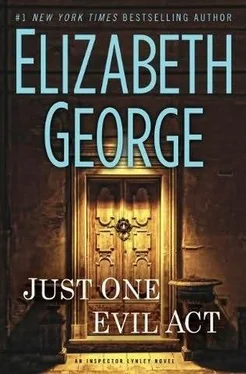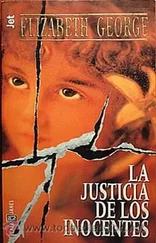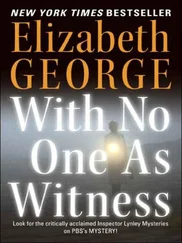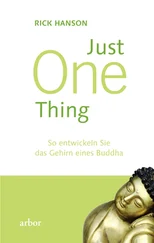They searched the market. They extended the search outside the city wall, where the rest of Lucca—the modern part of the town—spread out in all directions. They walked the top of the huge wall itself with its baluardi , the great ramparts from which defences were long ago maintained. On these were now planted trees and lawns, and among them were places children could play. But Hadiyyah had been nowhere on the wall, nor had she been just beneath it at the playground near Porta San Donato, so close to her school as to be a natural destination for a little girl tired of waiting for her parents.
Barbara looked at Azhar when the word parents was spoken. He looked as if he’d taken a blow.
At that point they began to think the unthinkable and had phoned the police. But Angelina had also phoned Azhar. Gone for a few days from University College, she’d learned. Not answering his mobile, she’d then discovered. Not answering his landline here in Chalk Farm, either. And that was when she knew what had actually happened.
“Angelina,” Azhar said desperately, “I was at a conference.”
“Where?” she demanded.
“Germany. Berlin.”
“You can prove that, sir?” the constable asked.
“Of course I can prove it. It was four days long. There were many sessions. I delivered a paper and also attended—”
“You left Berlin long enough to take her, didn’t you?” Angelina said. “That would have been simple. That’s what you did. Where is she, Hari? What have you done with her? Where have you taken her?”
“You must listen,” Azhar said, and then to her companion whom he had otherwise ignored, “You must ask her to listen. I could not find you once you left me, Angelina. I tried. Yes, I tried. I hired someone many months ago. But there was no trail. Please listen to me.”
“Madam,” the constable said, “this is a matter to be handled at the source, not here. The Italian police need to instigate a wider search, beyond Lucca. They’ll also be able to make sure that his attendance at this conference—”
“Do you know how easily he could have made it for himself to leave that bloody conference?” Angelina said. “He’s taken her from Italy, don’t you see? She might be in Germany. Why in God’s name won’t you listen to me?”
“How could I have taken her?” Azhar countered. He shot Barbara an agonised look.
She said, “Angelina, her passport. Her papers. Think. You took everything with you. I was here. I checked. Azhar came for me the night you left him. He couldn’t have taken her from Italy without documents of some kind.”
“Then you’re part of this,” Angelina declared. “You’ve helped him, haven’t you? You’d know how to get a false passport for her. Identity cards. Everything you need.” And saying this, she began to weep. “I want my daughter,” she cried. “I want my little girl.”
“On my life, I do not have her, Angelina,” Azhar said brokenly. “We must go to Italy at once to find her.”
ILFORD
GREATER LONDON
Neither Angelina nor her lover—a bloke whose name turned out to be Lorenzo Mura—was about to consider a return to Italy until whatever stones they’d decided needed to be turned over were turned over. Barbara learned this within a quarter hour’s conversation with them. No matter what Azhar produced in an attempt to convince his former lover that he’d been exactly where he said he’d been, no amount of paperwork—from the conference in Berlin, from the hotel in which he’d stayed, from the flight he’d taken to get there, from the restaurants in which he’d eaten—was going to persuade Angelina that time was of the essence in a kidnapping case and that time needed to be spent in Italy and not in a shouting match in Chalk Farm.
She wanted to go to Ilford, she announced. When she said this, Azhar looked so appalled that Barbara thought he might sick up on the floor. She herself said, “ Ilford? What in God’s name has Ilford got to do with anything?” and Azhar answered with four words that spoke volumes, “My wife and parents.”
Barbara said to Angelina, “You think he’s got Hadiyyah stowed with his parents? Come on, Angelina. Have some sense. We need to—”
“Shut up!” she screamed. The two constables tried to intervene, but before they could stop her, she had gone for Azhar. “You’d do anything !” she cried.
Barbara grabbed her and pulled her away, and when Angelina swung on her next, she said, “All right. Ilford. We’re going to Ilford.”
“Barbara, we cannot . . .” Azhar’s voice was a separate agony from everything else.
“We’re going to have to,” Barbara told him.
The local constables, at this point, were only too happy to leave the matter in the hands of the Metropolitan police. They faded out of the flat, and the one favour they did before departing the property altogether was to disperse the neighbours. Thus, when Barbara and her companions left Azhar’s flat and headed for his car, they were able to do so in a relatively inconspicuous manner.
They rode to Ilford in silence. Barbara could hear Lorenzo murmuring something to Angelina as they went along, but he did his murmuring in Italian, and he might as well have been speaking Martian.
Azhar kept his gaze on the road and a strangling grip upon the steering wheel. From his rapid and shallow breathing, Barbara had an idea of the degree to which he was wrestling with everything going on.
Azhar’s family turned out to live directly off Green Lane, just round the corner from an establishment called Ushan’s Fruit and Veg. It was a street of terrace houses like so many other similar streets in the city where the now-lit streetlamps shone on homes distinguished only by the nature of their patch of front garden. Unlike areas closer to the centre of town, however, this particular street wasn’t lined with cars. They would be an expense most families daren’t take on.
“Which one?” Angelina said, as Azhar stopped the car midway down the street.
Lorenzo opened the car door and helped her out. He kept his hand on the small of her back. Azhar indicated the house by going to the door. When he rang the bell, a teenage boy was the one to answer. It was a terrible moment. Barbara saw the anguish of it in the very immobility of Azhar’s face. She knew he was looking at his son. She also knew he hadn’t seen him in a decade.
That the boy hadn’t a clue who this group of people was was obvious enough. He said, “Yeah?” and used the heel of his hand to move his floppy hair from his forehead. Barbara saw Azhar make a gesture as if to touch the boy, but he stopped himself short of doing so. Then he said, “Sayyid. I am your father. Will you tell these people with me that no child has been brought to this house?”
The boy’s lips parted. He seemed to tear his gaze from Azhar, and he directed it to Barbara and then to Angelina. When he finally spoke, it was clear he’d been well schooled in the family history. “Which of them is the whore?” he asked.
Azhar said, “Sayyid. Please do as I say. Tell these people that no child of nine years old—a little girl—has been brought to this house.”
“Sayyid?” A woman’s voice, then. She spoke from behind the boy, sounding as if she was in another room. “Who is there, Sayyid?”
He made no reply. He locked eyes with his father, as if challenging him to identify himself to the wife he’d deserted. When he didn’t respond, footsteps approached and Sayyid stepped away from the door. Azhar and his wife stood face-to-face. Without looking at her son, she said, “Sayyid, go to your room.”
Barbara had expected the traditional dress of shalwar kameez . She’d expected the scarf. What she hadn’t expected was how beautiful Azhar’s wife was because she’d thought—perhaps like most people, she reckoned—that Azhar would have left an ordinary kind of woman in order to take up life with an extraordinary one. Men being men, she’d reckoned, they’d trade up, not down, not even across. But this woman far outclassed Angelina in the beauty department: dark, sloe-eyed, with cheekbones to kill for, a sensuous mouth, an elegant long neck, and perfect skin.
Читать дальше












